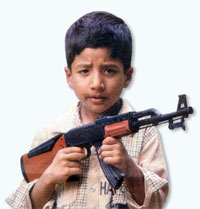|
|
In Jungkot, a remote village in Rolpa, children gather at the school ground to box and wrestle each other. When Maoist leader Barsaman Pun (Ananta) was young in these parts he played the same games. Pun served as a deputy commander of the Maoist army, and although peace has returned to Rolpa, the effects of the war are still visible. Aside from the physical destruction, there are the children who all play with plastic guns.
Seven-year-old Asheshraj Basnet, clad in camouflage fatigues, was firing off imaginary bullets from his plastic AK-47.
"Who are your enemies?" we asked.
"Maoists," he replied.
"Why?"
"They tortured the villagers."
Villagers told us Asheshraj's family was displaced by the Maoists during the conflict.
While Comrade Ananta's cadres enter parliament donning their new grey coats, his son, Utsav, plays Spiderman and pretends to kill imaginary enemies with his plastic Chinese pistol.
Pradip Pun's father was killed by the army. Until just two years ago, he was holding a real pistol in his hands, which he took up at the age of six. These days he plays cops and robbers with his friends in Thawang, holding a wooden gun. But the game looks more like guerrilla warfare. Combat clothes, which were banned during the war, have become popular with Rolpa's children. It is said a war affects three generations, and it may not be unusual for another generation of Rolpa's children to grow up playing war games.



